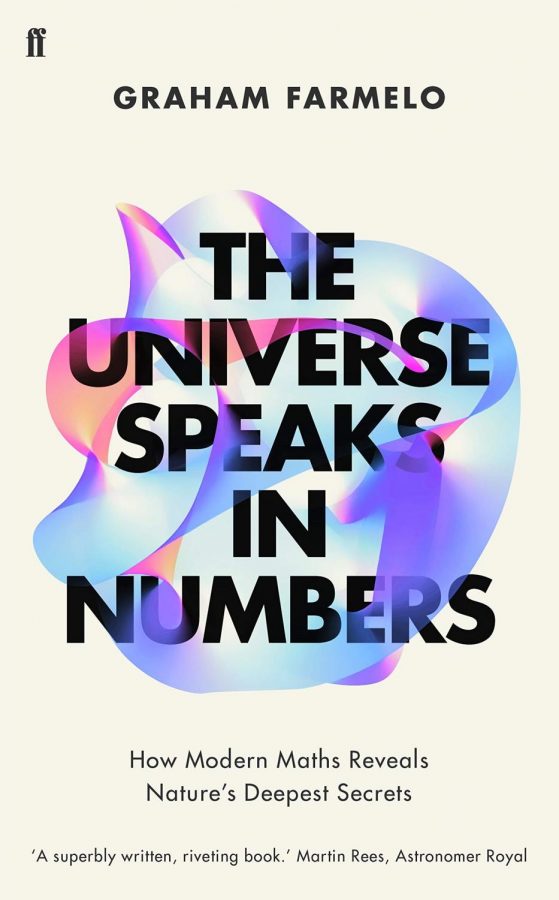“The Universe Speaks in Numbers”: The deep relationship between math and physics
Photo courtesy Hachette Book Group
Farmelo, a renowned physicist and writer, led a discussion surrounding topics covered in his book, “The Universe Speaks in Numbers: How Modern Maths Reveals Nature’s Deepest Secrets,” Nov. 14 at Snell Engineering Center.
November 20, 2019
From the breakthroughs of Einstein and Dirac to contemporary physicists and mathematicians who are shedding light on the blossoming and revolutionary interaction between mathematics and physics, Graham Farmelo’s new book takes readers on an adventure through the two fields’ relationship.
Farmelo, a renowned physicist and writer, led a discussion surrounding topics covered in his book, “The Universe Speaks in Numbers: How Modern Maths Reveals Nature’s Deepest Secrets,” Nov. 14 at Snell Engineering Center. Farmelo is a fellow at Churchill College at the University of Cambridge as well as an affiliated professor at Northeastern.
Nima Arkani-Hamed, one of the nation’s leading theoretical physicists and a professor in the School of Natural Sciences at the Institute for Advanced Study in Princeton, New Jersey, was Farmelo’s guest speaker for the event. He arrived a couple of minutes late to the event and still received a round of applause from the audience as he walked through the door.
The talk began with Farmelo introducing Arkani-Hamed as “the best theoretical physicist ever produced by McDonalds,” referencing the fact that Arkani-Hamed had worked two summers in the fast-food chain in his youth.
Arkani-Hamed explained that within the independent development in physics and mathematics, there’s more and more understanding of the deep and mysterious relationship between them. He said order can be made of our seemingly chaotic world and could be captured in succinct mathematical language.
Farmelo shared some of the foundational history of the field, beginning with Sir Isaac Newton, most well-known for his development of the three laws of motion. Farmelo explained that Newton would’ve never described himself as a theoretical physicist. Newton became one of the first to think that physicists should aim to make predictions about the world and that they could do so using defined mathematical calculations.
“This proposal was a radical agenda for the scientific community at the time, though it has since laid the foundation for the impetus of physics that was to follow,” Farmelo said.
Arkani-Hamed then interjected, saying one of his pet peeves is when people talk about theorists who are proven to be wrong about a certain theory, as if they are completely dumb, irrational or illogical for thinking that way.
He gave the example of the theory of luminiferous ether, a hypothetical medium for transmitting light and radiation, filling all unoccupied space. Ultimately, Einstein’s theory of relativity eliminated the need for a light-transmitting medium, disproving the existence of the ether.
“The luminiferous ether was a concept proposed by Newton who is, as aforementioned, a world-renowned physicist. Though Newton build the wrong scaffolding, it still lent way to the correct equations eventually,” Arkani-Hamed said.
According to Arkani-Hamed, quantum mechanics is the most revolutionary theory of the 20th century. Put simply, quantum mechanics is the application of quantum theory: the theoretical basis of modern physics that explains the nature and behavior of matter and energy on the atomic and subatomic level.
To give an example of how mathematics and physics are intrinsically intertwined, Farmelo and Arkani-Hamed talked about how British physicist Paul Dirac’s work gave way to something once thought unfeasible.
In 1928, Dirac wrote an equation that combined quantum theory and special relativity to describe the behavior of an electron moving at a relativistic speed. This equation posed a problem in the classical physics practice. Even Einstein is known to have said he couldn’t imagine any points of intersection between these two fundamental theories.
Dirac proposed the concept of antiparticles, which are particles that have all the same qualities as another particle but have an opposite electrical charge. This is the only way known to current physicists on how to successfully marry the theories of quantum mechanics and special relativity.
This intersection between two outrageously different theories is a relatively new revelation in the field of physics, and speaks to the deep, intricate and seemingly ever-growing connection between the worlds of mathematics and physics.
“There is a giant Truth — with a capital T — of the world out there that physics is constantly working towards, that is also somehow enlaced with a giant Truth — with a capital T — of the mathematical world,” Arkani-Hamed said.
Both Farmelo and Arkani-Hamed said they are excited by the impact of these two fields’ work in collaboration and believe there is much more to discover from their combination.
“We don’t actually know what reality is about. We are still learning, and we have to go into it with an open mind. Often, what we predict or assume something to be, can more easily be proven wrong than proven right,” Arkani-Hamed said.







